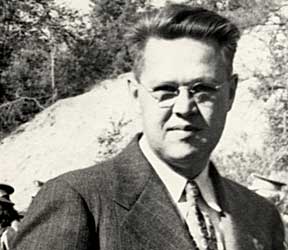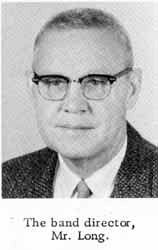

 |
Nick Sellas provided this picture of band director Aldie Long that his brother Deno Sellas took in 1948 or 1949. |
| The 1960 Big Rapids High School year book, The Rapidonian, included this picture of band director Aldie Long. |  |
Aldie Long was the band director for all of the Big Rapids, Michigan, public schools while Roseville Big Band director Glen Newton was a student there. He first came to Big Rapids High School in 1945 or earlier and retired after the 1968-69 school year, followed by Leon Brooks from 1969-1971. Brooks was the last BRHS band director to put on the Band Follies, which he renamed the Cardinal Follies.
He directed the concert band, which doubled as the marching band for football games in the fall and as the pep band during basketball seasons.
| In Glen's senior year, band director Aldie Long asked him to lead the pep band at basketball games. This mostly consisted of playing cheers, playing a few selections to entertain the crowd, and playing the music for the featured twirler. For one memorable game, Linda Benson (a French horn player in the band) was the featured twirler. Unfortunately, none of the sousaphone players had shown up, so David Baker, a fine cellist who played baritone in the band, volunteered to make up a bass part and play it on the baritone. Glen took his offer, and the band played Linda's march music sans Sousaphones, but with an odd-sounding set of low notes on the first and third beat of each measure, thanks to Dave. Afterward Linda confided that when she heard the music as she took the floor, she felt like crying. The next day, Aldie Long had a stern talk with the band, particularly the sousaphone players, and pep band attendance was not a problem for the rest of the season. |
The BRHS band under Aldie Long performed in the Ferris State College massed band festival, the Western Michigan University massed band festival, the Ferris homecoming parade, the Big Rapids Memorial Day parade, and the Traverse City Cherry Festival parade. For the Cherry Festival, Long established a policy that once every four years, the band would stay to watch the fireworks, so that a student who played in the band four years would have the chance to see them once. In the early 1960's, the BRHS band had the honor of leading the Cherry Festival parade, playing "Onward Christian Soldiers" for the Knights Templars marching behind them. In preparation for that honor, Long had the band practice marching at a suitable gait for the Templars, somewhat slower than the band's usual parade tempo.
His directing style leaned more to the casual than the frenetic. Glen Newton remembers that more than once, when the band was practicing a song that required little guidance from up front, Aldie Long would start the band on a section of the piece, retire to his office to read a magazine, then return to the front of the band just in time to conduct a hold and guide the band through the transition to the next section of music.
Aldie Long also formed the stage band and instituted The Band Follies, giving students the opportunity to produce a variety show every spring. His own experience playing violin and cornet in the pit bands for silent movies had given him first-hand experience with this genre which was rare among high school band directors of that era. Although he usually carefully auditioned each act to make sure it was worthy of the Band Follies, in the mid-1960's he gave the Balladaires the okay to perform whatever they wanted, because they had proven to be both musically adept and favorites with the audience.
He also encouraged students to participate in the Solo and Ensemble Festivals sponsored by the Michigan State Band and Orchestra Association, although the band itself never competed in the band competitions, because they fell at the same time as The Band Follies.
Long also taught instrumental music students at each of the grade schools in Big Rapids, starting them in fourth grade. Although he was a violinist, the schools had no orchestra program, so the students all started on band instruments.
| Aldie Long took the grade school band kids to Ferris when Bill Bell, the world-famous tubist, was presenting a seminar in the afternoon. Bell demonstrated how he warmed up with three-octave glissandi (which struck sixth grader Glen as a bit show-offy), then talked about how he could teach anybody to play the tuba. He asked for volunteers, and the two most eager were a college student who played saxophone and a 5th grade cornet player. Bell told the latter, who was the first to shoot up her hand, "No, honey, you're too young." Well, the college girl couldn't get beyond making spitting noises in the horn, despite numerous tries, so Bell finally let the 5th grader try. She produced a good sound on her first attempt! At the end of the seminar, Bell and two of his tuba students played a haunting unaccompanied exercise that remained in unison throughout most of the piece but ended with a major triad in open position. That was Glen's first exposure to what could be done musically with a tuba in the hands of a master. |
Among the noted musicians whose careers were shaped by their years in Aldie Long's BRHS band are flutist Kathleen Emmons Course (Flint Symphony, 1965-1991; teacher; MSBOA adjusticator), clarinetist James East (member of the woodwind faculty, SUNY Fredonia), vocalist and teacher John King, and pianist and professor William (known as Willie in high school) Fickes (Artistic Director at the Community Music Center of Boston (www.cmcb.org)).